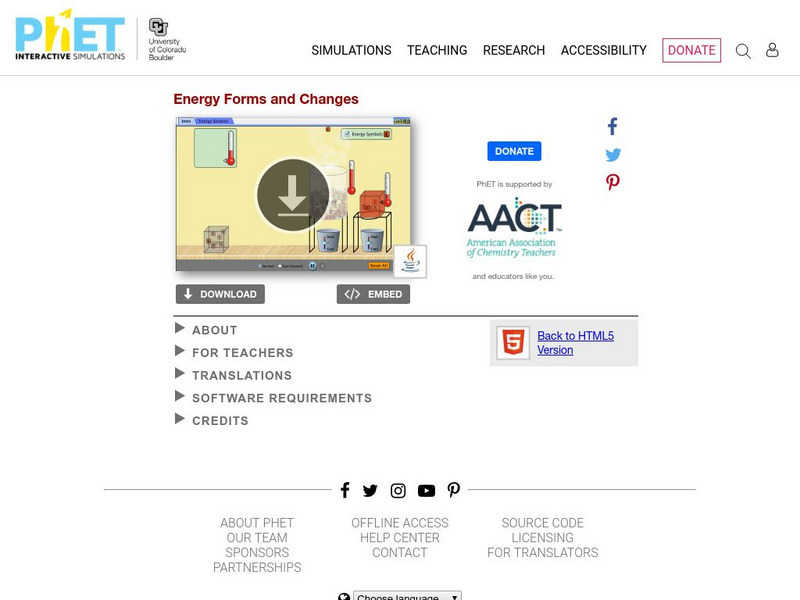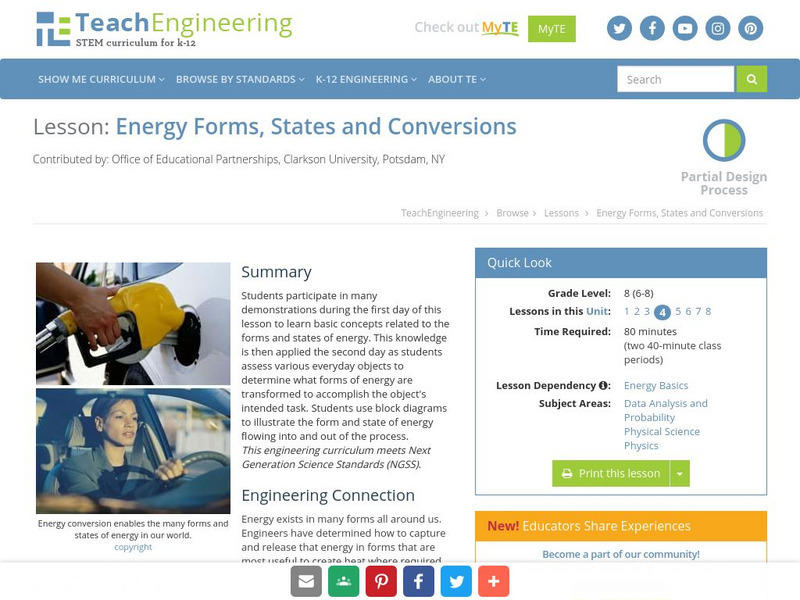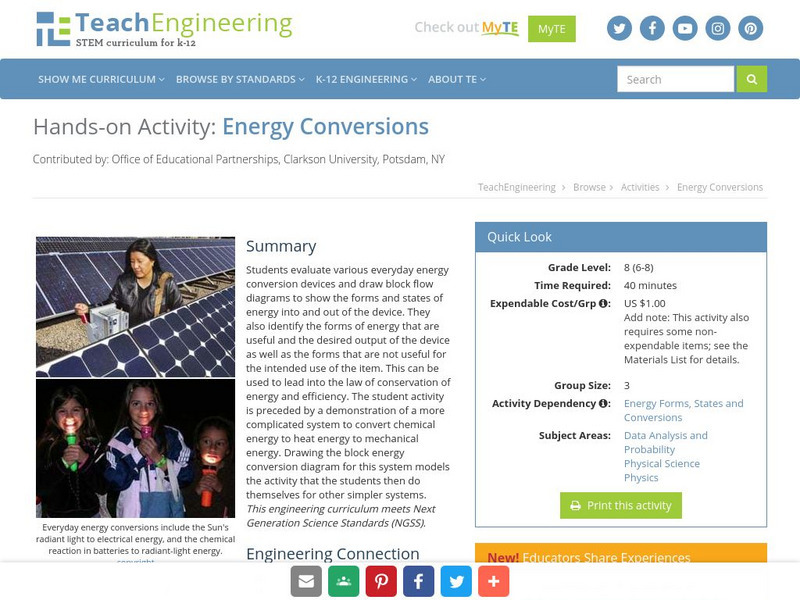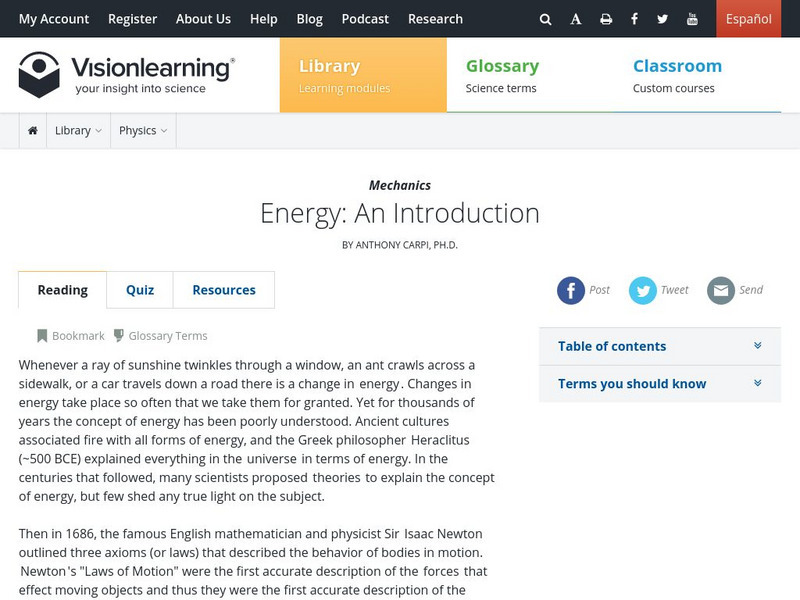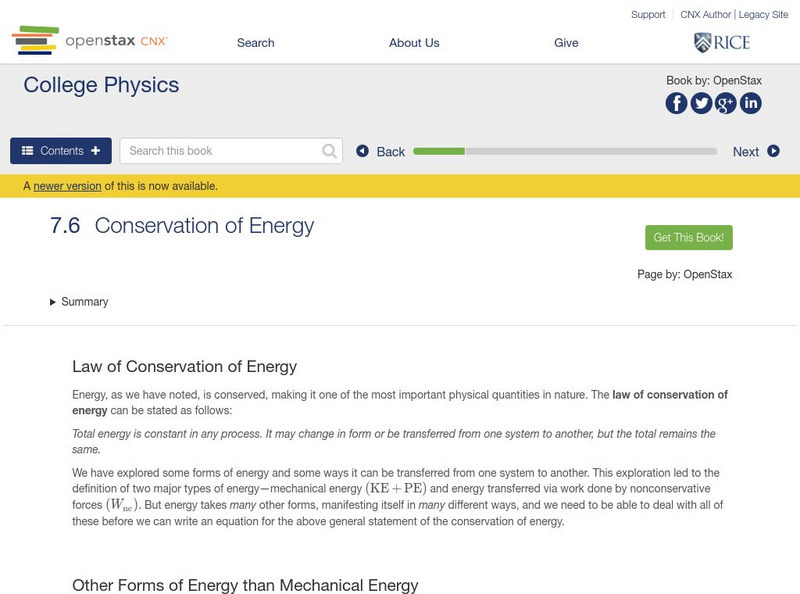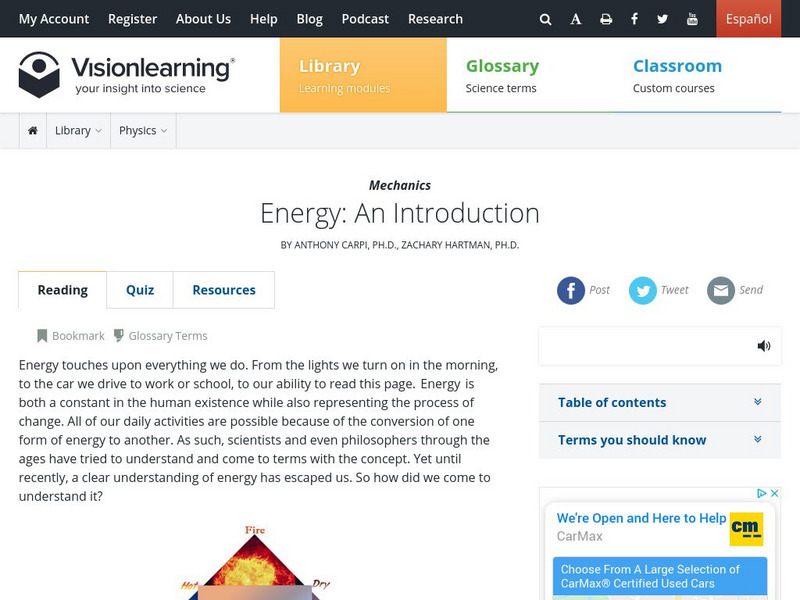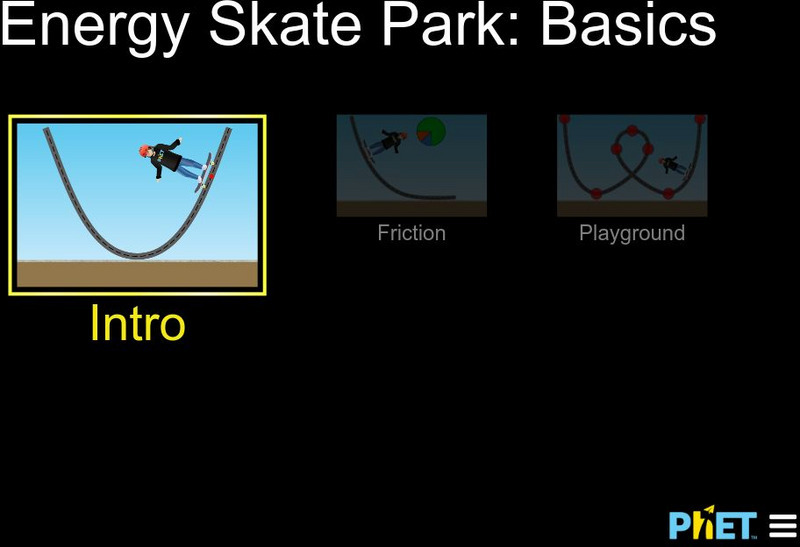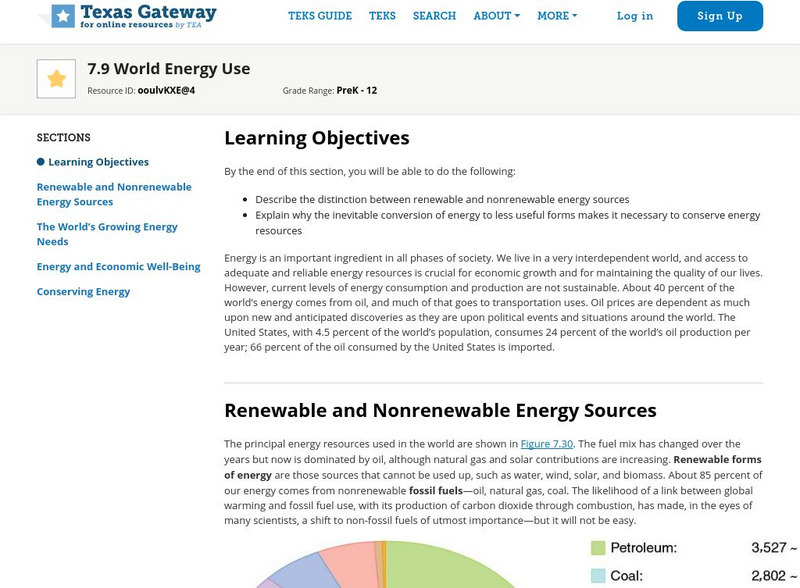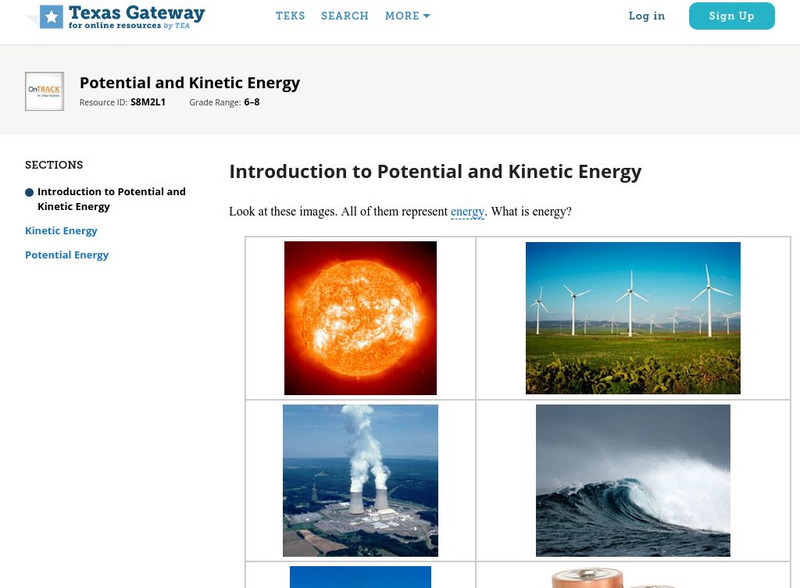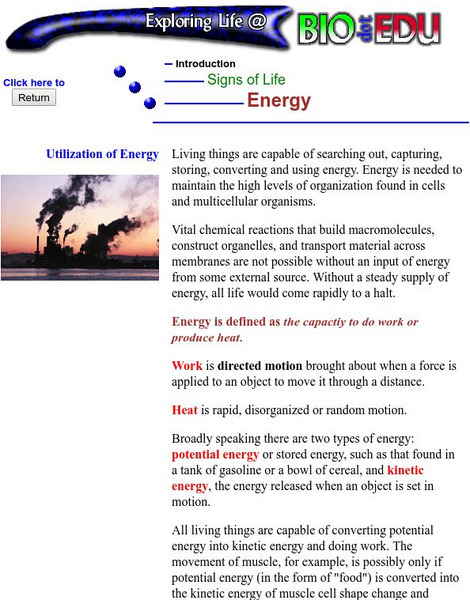US Energy Information Administration
U.s. Eia Energy Kids: What Is Energy: Forms of Energy
Government energy information site provides users with an understanding of what energy is, the forms of energy, energy efficiency, sources of energy as well as the Law of Conservation of Energy.
TeachEngineering
Teach Engineering: Energy Forms and States Demonstrations
Demonstrations explain the concepts of energy forms (sound, chemical, radiant [light], electrical, atomic [nuclear], mechanical, thermal [heat]) and states (potential, kinetic).
University of Colorado
University of Colorado: Ph Et Interactive Simulations: Energy Forms and Changes
Explore how heating and cooling iron, brick, and water adds or removes energy. See how energy is transferred between objects. Build your own system, with energy sources, changers, and users. Track and visualize how energy flows and...
TeachEngineering
Teach Engineering: Energy Forms, States and Conversions
Middle schoolers participate in many demonstrations during the first day of this lesson plan to learn basic concepts related to the forms and states of energy. This knowledge is then applied the second day as students assess various...
Annenberg Foundation
Annenberg Learner: Science in Focus Energy: What Is Energy?
A video workshop looking at the concept of energy. Discussions include energy as it is used in everyday language to the complex scientific meaning of energy. Presents common student misconceptions, history, and the importance of energy...
Khan Academy
Khan Academy: Energy Through Time
The quest for energy has always been a balancing act. As humans have gained greater control over their environment, they've found abundant resources - and faced numerous challenges. This article traces the history of our quest for energy.
TeachEngineering
Teach Engineering: Energy Conversions
Students evaluate various everyday energy conversion devices and draw block flow diagrams to show the forms and states of energy into and out of the device. They also identify the forms of energy that are useful and the desired output of...
TeachEngineering
Teach Engineering: Energy of Motion
By taking a look at the energy of motion all around us, students learn about the types of energy and their characteristics. They first learn about the two simplest forms of mechanical energy: kinetic and potential energy, as illustrated...
Texas Education Agency
Texas Gateway: Forms of Energy
Given diagrams, illustrations, or descriptions, students will identify the types of energy.
Vision Learning
Visionlearning: General Science: Energy: An Introduction
Instructional module focusing on energy. Discussion includes forms of energy, conservation of energy, and the laws of thermodynamics. Site also includes an interactive practice quiz and links relating to the topic.
OpenStax
Open Stax: Conservation of Energy
In the following tutorial, students will learn about the law of conservation of energy. They will read about some of the many forms of energy. They will understand the definition of efficiency of an energy conversion process as the...
Vision Learning
Visionlearning: Mechanics: Energy
Definitions of various forms of energy are presented along with a brief scientific history of energy related concepts.
University of Colorado
University of Colorado: Ph Et Interactive Simulations: Energy Skate Park
Explore kinetic, potential, and thermal energy as you send a skateboarder along several pre-built tracks, then design your own. Charts and graphs show the distribution of the different forms of energy, illustrating how the total energy...
Texas Education Agency
Texas Gateway: Ap Physics: World Energy Use
By the end of this section, you will be able to describe the distinction between renewable and nonrenewable energy sources and to explain why the inevitable conversion of energy to less useful forms makes it necessary to conserve energy...
American Geosciences Institute
American Geosciences Institute: Energy
Seven hands-on lessons module where students learn about energy. These inquiry-based explorations investigate where energy resources come from and how they are converted into electricity, how fossil fuels form, the importance of...
Texas Education Agency
Texas Gateway: Introduction to Potential and Kinetic Energy
Energy is the ability of a system to do work. That system may be batteries powering an electronic game system or windmills capturing wind energy to power a city. When an object or an organism does work, energy is transferred to another...
Texas Education Agency
Texas Gateway: Ready for an Energy Makeover?
Sometimes these are changes that happen routinely in the natural world, and sometimes these are "makeovers" where human creations transform energy into a specific form that serves a specific need. Either way, we call these changes energy...
Other
Salt River Project: Powering Our Future: Energy Transformations
Students test their understanding of energy transformations when shown a simple animation and a cloze-format response question. This activity could be utilized with a classroom response technology system.
US Energy Information Administration
U.s. Eia Energy Kids: Energy Basics
Learn about the definition of energy, the forms that it comes in, and the difference between renewable and nonrenewable sources.
Alabama Learning Exchange
Alex: Energy and Work Amusement Park Style
This is a lesson presenting energy and work. It covers: types of energy, forms of energy, work, law of conservation of energy, and renewable and nonrenewable energy sources. In the activities section, one will find links to Internet...
City University of New York
Energy: Characteristics of Life
An explanation of types of energy, how living things use energy and how they can convert energy forms. This is a good, basic, start to studying this characteristic of life.
Sophia Learning
Sophia: Energy Forms: Lesson 2
This lesson will explain the advantages and disadvantages of generating electricity from various forms of energy. It is 2 of 4 in the series titled "Energy Forms."
Sophia Learning
Sophia: Energy Forms: Lesson 3
This lesson will explain the advantages and disadvantages of generating electricity from various forms of energy. It is 3 of 4 in the series titled "Energy Forms."
Sophia Learning
Sophia: Energy Forms: Lesson 4
This lesson will explain the advantages and disadvantages of generating electricity from various forms of energy. It is 4 of 4 in the series titled "Energy Forms."
Other popular searches
- Forms of Energy
- Forms of Energy Worksheets
- Alternative Energy Forms
- The Forms of Energy
- Different Forms of Energy
- 6 Forms of Energy
- Forms of Energy Poster
- Forms of Heat Energy
- Alternative Forms of Energy
- Forms of Potential Energy
- Science Forms of Energy
- Various Forms of Energy


